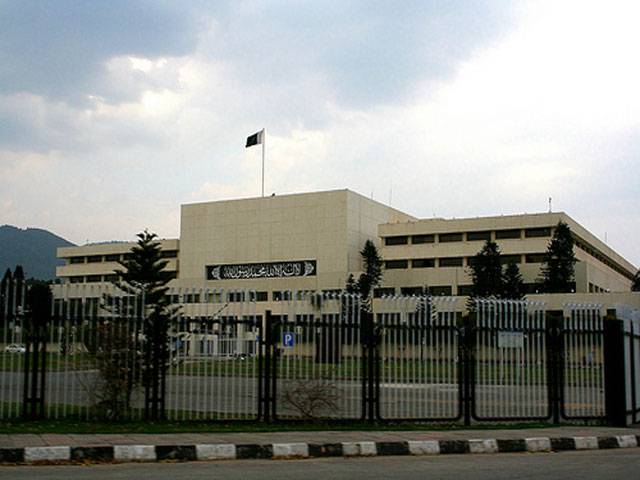ISLAMABAD - The government on Wednesday failed to have a smooth sailing in getting the much-debated Protection of Pakistan (Amendment) Ordinance 2014, passed by a parliamentary panel, in the wake of enormous criticism from the opposition parties.
A National Assembly’s standing committee deferred the bill till the next week after the major opposition parties in the Lower House of the Parliament, including PPP, PTI and MQM, opposed it.
An in-camera session of the National Assembly Standing Committee on Interior was held at the Constitution Room of the Parliament to discuss the Protection of Pakistan (Amendment) Ordinance 2014 that suggests further amendments in the Protection of Pakistan Ordinance 2013.
The ordinance was tabled in National Assembly on January 30, 2014, during the 4th sitting of its 8th session.
According to an insider, the government wanted to get the bill passed without holding a detailed discussion in the committee, but the bill was deferred till Tuesday after the major opposition parties in the NA, including PPP, MQM, PTI and JI, opposed it. The committee members were of the view that certain clauses of the bill were violation of fundamental rights as well as human rights and they needed some time to study the bill so that the amendments in it could be proposed.
The committee will now hold its meeting on next Tuesday to discuss the bill.
Nawab Yousaf Talpur of Pakistan People’s Party told The Nation that the members sought some time to study the bill to see whether amendments in the ordinance were better or they were violation of human rights. “We have sought some time from the chair to deeply look into the draft of the amended ordinance,” he said.
Dr Arif Alvi of Pakistan Tehreek-e-Insaf, who is also a member of the committee, terming the ordinance poorly drafted, said there was no necessity to promulgate the amended ordinance when the original ordinance of Protection of Pakistan Ordinance 2013 was still lying before the floor of the Lower House of the Parliament. He said the government could made amendments in the original ordinance instead of promulgating a new amended ordinance.
Dr Alvi also remarked there were basic flaws in certain clauses of the bill in addition to being contradictory in its nature. Mentioning one of the clauses of the bill, he termed it a violation of the basic fundamental rights and questioned how a court of law could cancel the Pakistani citizenship of any person. “No one in the world can cancel natural citizenship,” he added. He noted that other clauses of the ordinance that it could not be challenged in any court of law and on the application of government any case in any court of law court could be transferred to a special court were contradictory.
“It means any case before the Supreme Court or any high court could be transferred to a special court under this ordinance,” he viewed. According to another clause of the ordinance, any one arrested under the ordinance would be dealt with retrospective effect, Dr Alvi said.
Friday, April 19, 2024
NA body defers PPO till next week
| Bill faces strong criticism from major Opp parties

Caption: NA body defers PPO till next week
Mehwish Hayat says she would like to work with Aamir Khan
9:59 PM | April 18, 2024
'That'll be awesome,' Rohit Sharma on idea of Pakistan vs India Test series
9:17 PM | April 18, 2024
Turkiye commends Pakistan's efforts in fostering regional peace
9:03 PM | April 18, 2024
CM Maryam's security squad hits biker to death in Narowal
9:02 PM | April 18, 2024
Hafiz Naeemur Rehman sworn in as new emir of Jamaat-e-Islami
8:54 PM | April 18, 2024
Hepatitis Challenge
April 18, 2024
IMF Predictions
April 18, 2024
Wheat War
April 18, 2024
Rail Revival
April 17, 2024
Addressing Climate Change
April 17, 2024
Justice denied
April 18, 2024
AI dilemmas unveiled
April 18, 2024
Tax tangle
April 18, 2024
Workforce inequality
April 17, 2024
New partnerships
April 17, 2024
ePaper - Nawaiwaqt
Advertisement
Nawaiwaqt Group | Copyright © 2024





